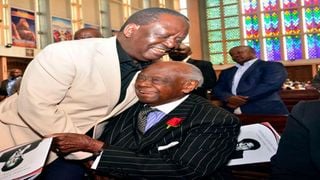
Orange Democratic Movement leader Raila Odinga with former Attorney General Charles Njonjo during the 50th memorial service of Tom Mboya Holy Family Basilica on July 5, 2019.
| File | Nation Media GroupNews
Premium
The ‘traitor’ and why police boss tore Raila Odinga’s statement on Charles Njonjo
One day in 1983, President Daniel arap Moi sensationally said an unnamed person was scheming with foreign powers to overthrow his government, a pronouncement that set off events that led to the fall of Constitutional Affairs Minister Charles Njonjo.
Damning allegations were made against Njonjo during proceedings of the Judicial Commission chaired by Justice E Miller in 1983.
The November 9, 1984 report of the commission also gives Mr Raila Odinga’s role in the proceedings. He was being detained without trial at the time.
Former Cabinet Minister James Osogo in his memoirs, Honourable Deeds: The James Osogo Story, recalls the statement by President Moi at a rally in Kisii.
As Kenyans speculated on who the President meant, MPs too, began referring to msaliti (traitor) in the House and rallies in a well-choreographed drive.
Two weeks after Mr Moi’s speech, Mr Osogo says, Cabinet Minister Elijah Mwangale named his colleague Njonjo as the traitor.
Revelation
Before the startling revelation, Njonjo had arrived at JKIA from abroad and denied being the traitor. Several MPs, including Njonjo’s supposed friends, began pressing for his resignation from Cabinet and Parliament.
He was also accused of having engineered the passing of a constitutional amendment making Kenya a one party state. By doing this, Njonjo had ironically sealed his fate and left partyless.
In Moi’s days, one was doomed when heard talking and damned on remaining silent over an issue.
“Taking too long to take sides was a bigger sin. Timing was important,” Mr Osogo says.
The commission of inquiry set by Mr Moi was made up of three judges, two from the Court of Appeal.
One of those called to testify was Mr Odinga. At the time of his testimony on July 26 1984, Mr Odinga had been in detention since March 23, 1983. He had been picked up after the failed August 1, 1982 military coup.
Mr Odinga said he had a conversation with Kiprono arap Keino, the Deputy Parliamentary Speaker at Hilton Hotel in March 1982.
According to the report compiled by the commission, Mr Odinga’s interest in Mr Njonjo was first aroused in mid-1981, when a Ugandan diplomat friend of his (Odinga) requested for assistance in investigations involving Mr Njonjo and some Ugandans to the effect that South African was attempting to destabilise Uganda.
Mr Odinga wrote a statement on his alleged role in the failed coup while in custody at GSU headquarters, Ruaraka.
However, Commissioner of Police Ben Gethi tore it and ordered him to write a “proper” one. He did that four times. Mr Odinga said Mr Gethi objected to the Njonjo reference.
Overthrow the government
“I stated that I had received information to the effect that Mr Njonjo had made plans to overthrow the government of Kenya with the aid of South African and Israeli mercenaries and the GSU. Substantial amounts of arms had been smuggled into the country. Some...were in the Aberdares and the said coup was to take place on August, 1982. I also stated that the same source had said several South Africans and Israeli agents had come into the country,” according to the report quoting Mr Odinga.
Then the report adds: “We accept Odinga’s evidence, supported as it is by (GSU inspector Mwaniki) Muriithi, that Gethi tore up his statements...It was abundantly clear that Njonjo and Gethi had known each other over a long period.”
Mr Osogo says Njonjo allies were named during the commission hearings.
“There were allegations of how the fallen minister brought MPs to his side with an aim of toppling the government through a motion of no confidence,” he says.
“After about 100 days of sitting, the commission found the fallen minister guilty of scheming to take over the presidency of the country.”
Ordinarily, the minister should have then been arraigned for treason.
However, President Moi surprised everybody by forgiving Njonjo, apparently due to his advanced age and distinguished civil service to Kenya.
“That was 1983. The msaliti chapter was closed,” he says.





